|
|
|
Sort Order |
|
|
|
Items / Page
|
|
|
|
|
|
|
| Srl | Item |
| 1 |
ID:
143576


|
|
|
|
|
| Summary/Abstract |
Globally there is an increasing focus on the private sector as a significant development actor. One element of the private sector’s role emphasised within this new focus has been corporate social responsibility (CSR) activities, whereby the private sector claims to contribute directly to local development. There is now a substantial body of work on CSR but it is a literature that is mostly polarised, dominated by concerns from the corporate perspective, and not adequately theorised. Corporations typically do development differently from NGOs and donors, yet the nature and effects of these initiatives are both under-researched and under-conceptualised. In this paper we argue that viewing CSR initiatives through a community development lens provides new insights into their rationale and effects. Specifically we develop a conceptual framework that draws together agency and practice-centred approaches in order to illuminate the processes and relationships that underpin corporate community development initiatives.
|
|
|
|
|
|
|
|
|
|
|
|
|
|
|
|
| 2 |
ID:
143574
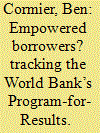

|
|
|
|
|
| Summary/Abstract |
The World Bank has developed a new lending instrument, called Program-for-Results (P4R). This instrument is notable because it emphasises borrower programmes and contexts, ostensibly shifting from universally applied Washington Consensus models. Why did the Bank develop P4R? First, theoretical grounds for a new Bank policy are outlined. Second, the context, formalisation and usage of P4R are analysed. Third, P4R’s possible futures are described, along with their implications for development lending theory and practice. Despite its embryonic status, scholars and practitioners will be able to learn about power in development lending by following the fate of P4R.
|
|
|
|
|
|
|
|
|
|
|
|
|
|
|
|
| 3 |
ID:
143581
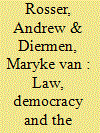

|
|
|
|
|
| Summary/Abstract |
In recent years a debate has emerged about the conditions under which justiciable legal frameworks facilitate the fulfilment of socioeconomic rights. This debate has pitted institutionalist perspectives that emphasise the progressive potential of democratisation against structuralist perspectives that emphasise the constraints imposed by relationships of power and interest. This paper considers the debate in light of Indonesia’s recent experience. It suggests that we need to examine how institutional and structural factors interact within particular contexts to shape socioeconomic rights fulfilment, not examine these factors in isolation. It also considers the strategic implications of this argument for rights proponents.
|
|
|
|
|
|
|
|
|
|
|
|
|
|
|
|
| 4 |
ID:
143579
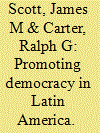

|
|
|
|
|
| Summary/Abstract |
Since the Cold War the USA has articulated and implemented explicit strategies of democracy promotion. One interesting target of such efforts is Latin America, in part because of the region’s geographic proximity to the USA and of the mixed record of US support for democracy there. This paper examines the impact of the end of the Cold War and the 9/11 episode on the nature, purposes, targets and consequences of US democracy assistance to Latin America. Examining democracy aid allocations, social and political factors and other variables, it traces changes in aid strategies, purposes and recipients generated by these paradigm shifts, and assesses the impact of such assistance on the politics of the region. It concludes with implications of these findings for US democracy promotion policies.
|
|
|
|
|
|
|
|
|
|
|
|
|
|
|
|
| 5 |
ID:
143573
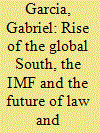

|
|
|
|
|
| Summary/Abstract |
Following the onset of the Asian Financial Crisis the world has witnessed a re-accommodation of the global financial system. In the particular case of middle-income countries they have disentangled themselves from the conditionality of the IMF and grown into more assertive actors in international forums, proposing new alternative mechanisms to become more financially independent and for the provision of development assistance. This article critically reviews the new reality by assessing the strategies deployed by developing countries to reduce the IMF’s influence, and explores the potential consequences of the rise of middle-income nations for Law and Development.
|
|
|
|
|
|
|
|
|
|
|
|
|
|
|
|
| 6 |
ID:
143582


|
|
|
|
|
| Summary/Abstract |
This article investigates Rwanda’s agricultural policies and institutions as a historically contextualised response to exceptionally adverse developmental circumstances. Using the agrarian question as an analytical point of reference, the article argues that it is extremely difficult to identify how increases in productivity and income in smallholder agriculture can be achieved without forceful state action and a sustained injection of resources. In light of this, entirely right-congruent governance is caught in a dilemma about the extent to which the government overrides peasants’ own agency and the extent to which the agrarian strategy produces a sustained and stable transformation in agriculture. Rather than making a defence or condemnation of the government’s strategy, the article argues against pre-emptive judgements of an agrarian strategy that can only discernibly attain success over a long period. What the article does do is insist that there is development potential in the current strategy, not simply a disaster in the making.
|
|
|
|
|
|
|
|
|
|
|
|
|
|
|
|
| 7 |
ID:
143577
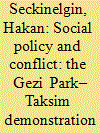

|
|
|
|
|
| Summary/Abstract |
This article argues that conflicts are productive forces within which new ideas are developed and new social relations are articulated. The critical issue here is the way in which such conflicts are managed and mediated. The paper analyses the Gezi Events of May–June 2013 in Istanbul and considers the way in which people’s reactions in these events are linked with the intersection of everyday lives and the Justice and Development Party (Adalet ve Kalkinma Partisi – AKP) government’s social policy initiatives, which are increasingly framing these everyday lives. Social policy is considered to be the domain of this intersection, as the government uses policies to inform a particular way of orienting individuals’ everyday
|
|
|
|
|
|
|
|
|
|
|
|
|
|
|
|
| 8 |
ID:
143580
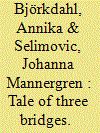

|
|
|
|
|
| Summary/Abstract |
This article explores agonistic processes of peace, which are situated within and constitutive of different spaces and places. Three contested cities, Sarajevo, Mostar and Višegrad in Bosnia-Herzegovina, provide us with local sites where peace and peace building in various forms ‘take place’ as people come together in collective action. Through a close reading of three symbolically and materially important bridges in the towns, we reveal meaning-making processes, as agentive subjects struggle around competing claims in the post-conflict everyday world. The collective, situated and fleeting agency that we explore through the Arendtian notion of ‘space of appearance’ invests space with meaning, belonging and identity. Thus, this article grapples with agonistic peace as it manifests itself in materiality and spatial practices. We use the social and material spaces of the city to locate agency and agonism in peace building as they relate to the conflict legacy in Mostar, Višegrad and Sarajevo in order to advance the critical peace research agenda.
|
|
|
|
|
|
|
|
|
|
|
|
|
|
|
|
| 9 |
ID:
143575


|
|
|
|
|
| Summary/Abstract |
South Asian women are a focus area for organisations such as the UN, World Bank and WHO, where violence against women severely constrains policy instruments such as the Millennium Development Goals. The field researcher is often invisible in research space, which informs policy in practice. Through critical reflexivity we rupture the silence on researcher vulnerability, foregrounding researcher resilience as the ethical compass in the research space of gendered violence. Through narratives of researchers as development actors in the river of corrosiveness involved in acid violence research, we offer a typology for researcher resilience for consideration in research designs for policy development.
|
|
|
|
|
|
|
|
|
|
|
|
|
|
|
|
| 10 |
ID:
143578
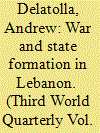

|
|
|
|
|
| Summary/Abstract |
State formation in the developing world can be explained as growing centralisation and institutionalisation. To understand why some states struggle with state formation, or the processes of centralisation, the model provided by Charles Tilly, in his analysis of state formation in Western Europe, is applied to Lebanon, starting at the onset of the 1975 civil war and concluding with an analysis of the post-Syrian occupation environment. With the appropriate conditions it is possible to use Tilly’s model of war making and the state to measure state formation, or the lack thereof, in the developing world. Conclusively, in the case of Lebanon, it is evident that progress towards strong state formation has been made because of processes of war that are similar to those Tilly outlines in his historical analysis of Western Europe.
|
|
|
|
|
|
|
|
|
|
|
|
|
|
|
|
|
|
|
|
|